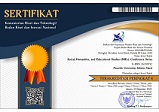Profile of Critical Thinking Skills of Fifth Grade Elementary School Students Reviewed from a Gender Perspective
Abstract
Critical thinking skills are a necessity in learning. This ability is a continuous development and can be stimulated from an early age. This study aims to describe the differences in critical thinking skills of male and female students in solving mathematical problems on fractions. The research method used is descriptive qualitative research, by combining data analysis techniques such as data reduction, data presentation, and drawing conclusions. Data collection techniques include tests and interviews. The sample used was 85 fifth grade students in 4 Elementary Schools in the Diponegoro Cluster using a purposive sampling technique. The data collection technique used a critical thinking ability test reviewed from 4 indicator items, namely (1) interpretation, (2) analysis, (3) evaluation, and (4) inference. The results of the study showed that female students had higher critical thinking skills than male students. The average score of female students was in the medium category, namely 73.10, while male students were in the low category, namely 59.80. The superiority of female students was also seen in the percentage of achievement of each critical thinking indicator, including interpretation, analysis, evaluation, and inference. The interests of each individual influence differences in learning, accuracy levels, and cognitive abilities. This research provides practical implications to be the basis for designing learning strategies that are more responsive to gender differences and considerations in compiling teaching materials that emphasize indicators of critical thinking skills (interpretation, analysis, evaluation, inference)
Keywords
Full Text:
PDFRefbacks
- There are currently no refbacks.





